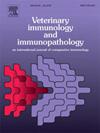靶向猪瘟病毒Erns蛋白的单克隆抗体在病毒检测中的应用
IF 1.4
3区 农林科学
Q4 IMMUNOLOGY
引用次数: 0
摘要
猪瘟(CSF),由猪瘟病毒(CSFV)引起;猪瘟属)是一种在猪中具有高度传染性的疾病,给全世界的养猪户造成严重的经济损失。猪瘟病毒感染的早期和准确诊断对于有效控制该疾病至关重要,特别是在流行地区。本研究成功地在大肠杆菌中表达了全长病毒蛋白Erns。重组蛋白经Ni-NTA亲和层析纯化,western blot和间接ELISA (iELISA)鉴定其抗原性。纯化的Erns蛋白用作免疫原,产生产生单克隆抗体(mab)的小鼠杂交瘤。利用elisa和western blotting对15个靶向该蛋白的单克隆抗体进行了鉴定,因为它们能够与CSFV感染培养物中的天然抗原发生反应。这些单克隆抗体有潜力用于开发诊断工具,特别是用于通过终点稀释试验检测和滴定病毒感染培养物。本文章由计算机程序翻译,如有差异,请以英文原文为准。
Monoclonal antibodies targeting the Erns protein of classical swine fever virus: application for virus detection
Classical swine fever (CSF), caused by the classical swine fever virus (CSFV; genus Pestivirus), is a highly transmissible disease in pigs that leads to severe economic losses for pig farmers worldwide. Early and accurate diagnosis of CSFV infections is crucial for effective containment of the disease, especially in endemic areas. In this study, the full-length viral protein Erns was successfully expressed in E. coli. The recombinant protein was purified using Ni-NTA affinity chromatography, and its antigenicity confirmed by western blot and indirect ELISA (iELISA) using CSFV-specific antiserum. The purified Erns protein was then used as an immunogen to generate murine hybridomas producing monoclonal antibodies (mAbs). A panel of 15 mAbs targeting this protein was characterized using iELISA and western blotting, for their ability to react with native antigens in cultures infected with CSFV. These mAbs have the potential to be used in the development of diagnostic tools, particularly for the detection and titration of virus-infected cultures through endpoint dilution assays.
求助全文
通过发布文献求助,成功后即可免费获取论文全文。
去求助
来源期刊
CiteScore
3.40
自引率
5.60%
发文量
79
审稿时长
70 days
期刊介绍:
The journal reports basic, comparative and clinical immunology as they pertain to the animal species designated here: livestock, poultry, and fish species that are major food animals and companion animals such as cats, dogs, horses and camels, and wildlife species that act as reservoirs for food, companion or human infectious diseases, or as models for human disease.
Rodent models of infectious diseases that are of importance in the animal species indicated above,when the disease requires a level of containment that is not readily available for larger animal experimentation (ABSL3), will be considered. Papers on rabbits, lizards, guinea pigs, badgers, armadillos, elephants, antelope, and buffalo will be reviewed if the research advances our fundamental understanding of immunology, or if they act as a reservoir of infectious disease for the primary animal species designated above, or for humans. Manuscripts employing other species will be reviewed if justified as fitting into the categories above.
The following topics are appropriate: biology of cells and mechanisms of the immune system, immunochemistry, immunodeficiencies, immunodiagnosis, immunogenetics, immunopathology, immunology of infectious disease and tumors, immunoprophylaxis including vaccine development and delivery, immunological aspects of pregnancy including passive immunity, autoimmuity, neuroimmunology, and transplanatation immunology. Manuscripts that describe new genes and development of tools such as monoclonal antibodies are also of interest when part of a larger biological study. Studies employing extracts or constituents (plant extracts, feed additives or microbiome) must be sufficiently defined to be reproduced in other laboratories and also provide evidence for possible mechanisms and not simply show an effect on the immune system.

 求助内容:
求助内容: 应助结果提醒方式:
应助结果提醒方式:


